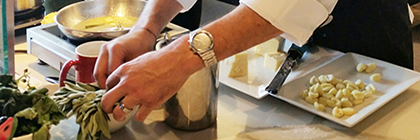The following is an important message to York University community members from President and Vice-Chancellor Rhonda L. Lenton:
La version française suit la version anglaise.
Dear Colleagues,
As a follow-up to the communication I sent out on Friday, July 31, I am writing to provide further details about what you can expect from the University in the coming weeks and months.
As I indicated last week, while Toronto has moved to Stage 3, the pandemic is still ongoing. The gradual reopening of our campuses will therefore continue to be guided by public health guidelines and the government. Within those guidelines, the goal is to make the best use of our facilities to meet urgent needs of students, faculty and staff in ways that put the health and safety of our community first. As you know, only a select number of courses have been approved for in-person activities in the fall term, and we anticipate that most of our employees will continue to work remotely for the duration of the fall term.
I am confident that our approach will enable the University to provide a high-quality learning experience for our students and allow research activities to proceed.
Gradual return to campus
As it is safe to do, so we will continue to implement a gradual return of campus activities guided by York’s Emergency Operations Centre, and in consultation with other universities, the Government of Ontario, and Public Health officials.
Ramping Up Research
On June 29, in compliance with public health directives and following institutional principles and guidelines, we started to gradually re-open research labs that were closed due to the pandemic. The University began opening research spaces to faculty members who had graduate students near completion, and who had other deadline-driven or seasonal research. We anticipate opening additional research spaces beginning the week of Aug. 17 to support post docs nearing the end of funding, researchers with imminent grant or publication deadlines, and early career researchers whose work cannot continue remotely. The phased return to on-campus research activities is continuing as part of the Ramping Up Research recovery plan.
Fall term 2020
The University has a full selection of academic programming for the fall term, with more than 95 per cent of the 3,500 undergraduate courses being taught through online and remote delivery. We expect that more graduate courses can be offered in person during the fall term due to their generally smaller size and will be able to share more information about those courses shortly. Careful planning has facilitated our ability to offer experiential in-person learning in a select number of courses, including labs, studios and clinical placements, and additional details will be shared shortly.
Winter term 2021
We understand that many students, faculty and instructors are seeking guidance about course delivery modes required for the winter term. Discussions have been ongoing with public health authorities and various levels of government regarding challenges for winter including the likelihood of border openings. Work to clarify plans for the winter term is underway, and more information will be available soon.
Campus safety
The wearing of non-medical mouth and nose coverings continues to be mandatory at York, if maintaining two-meter physical distancing is not possible or predictable in common and shared spaces within buildings. To ensure maximum physical distancing, classrooms, shared offices, library facilities, teaching labs and other academic and non-academic spaces are being reorganized. In high-traffic areas where maintaining physical distancing is not possible, additional protective measures such as plexiglass barriers are being installed. The University is also implementing requirements for deep cleaning prior to reopening new spaces, installing adequate signage and hand sanitizers, and ensuring that systems are in place so that we stay within prescribed limits on the number of people who can congregate indoors and outdoors.
In addition, a training module on health and safety measures has been developed and all faculty and staff will be required to complete the training prior to returning to campus.
Campus information
Updates and information will continue to be posted on our Better Together website, and directly to community members, including:
- services available on our campuses;
- what is open and closed on campuses;
- processes and procedures to maintain the health and safety of our community members; and
- where to find important campus information.
A healthy, safe and successful fall term
I would like to express my sincere gratitude and thanks to our students, York’s Emergency Operations Centre Team, the Emergency Policy Group, deans, faculty members, librarians, and staff, for their leadership, perseverance, patience and support as we have successfully navigated these past extraordinary months – while preparing for the extraordinary months still to come.
I remain confident that by working together, we will ensure a healthy, safe and successful start to the new academic year in September.
Sincerely,
Rhonda L. Lenton
President and Vice-Chancellor
Préparation d’une nouvelle année universitaire
Chers collègues,
Pour faire suite au communiqué envoyé le vendredi 31 juillet, je vous écris pour vous donner plus de détails sur ce que vous pouvez attendre de l’Université dans les semaines et mois à venir.
Comme je vous l’ai dit la semaine dernière, bien que Toronto soit passée à l’étape 3 du déconfinement, la pandémie n’est pas finie. La réouverture graduelle de nos campus continue donc d’être orientée par les directives de la santé publique et du gouvernement. Dans le cadre de ces directives, notre objectif est de maximiser l’utilisation de nos installations pour répondre aux besoins urgents du corps étudiant, du corps professoral et du personnel tout en privilégiant la santé et la sécurité de notre communauté. Comme vous le savez, un nombre restreint de cours du trimestre d’automne ont été approuvés pour des activités en présentiel et nous nous attendons à ce que la majorité de nos employés continuent de travailler à distance durant le trimestre d’automne.
Je suis persuadée que cette approche permettra à l’Université de fournir une expérience d’apprentissage de grande qualité aux étudiants et étudiantes et de continuer les activités de recherche.
Retour graduel sur le campus
Nous continuerons à reprendre graduellement les activités sur le campus de façon sécuritaire en suivant les directives du Centre des opérations d’urgence de York et après consultation avec les autres universités, le gouvernement de l’Ontario et les responsables de la santé publique.
Reprise des activités de recherche
Le 29 juin, conformément aux instructions de la santé publique et aux lignes directrices institutionnelles, nous avons commencé à rouvrir graduellement les laboratoires de recherche qui étaient fermés en raison de la pandémie. L’Université a entrepris de rouvrir les locaux de recherche pour les membres du corps professoral dont les étudiants de cycle supérieur achevaient leurs études et ceux qui avaient des échéances à respecter ou qui faisaient des recherches saisonnières. Nous prévoyons ouvrir d’autres espaces de recherche à compter de la semaine du 17 août pour appuyer les étudiants de postdoctorat dont le financement tire à sa fin, les chercheurs ayant des subventions ou des dates de publication imminentes, et les chercheurs en début de carrière qui ne peuvent pas poursuivre leur travail à distance. Le retour graduel des activités de recherche sur les campus continue dans le cadre du plan de reprise de la recherche.
Trimestre d’automne 2020
L’Université offre une gamme complète de programmes académiques pour le trimestre d’automne; plus de 95 pour cent des 3 500 cours de premier cycle seront donnés en ligne ou à distance. Nous comptons offrir plus de cours de cycle supérieur en personne durant le trimestre d’automne en raison de la petite taille des classes; nous vous communiquerons prochainement des informations à ce sujet. Grâce à une planification minutieuse, nous pourrons offrir des possibilités d’éducation expérientielle en personne pour plusieurs cours, comme des laboratoires et des placements cliniques; plus d’information sera fournie prochainement.
Trimestre d’hiver 2021
Nous sommes conscients que de nombreux membres du corps étudiant, du corps professoral et du corps enseignant sont à la recherche de conseils sur les modes de prestation de cours requis pour le trimestre d’hiver. Nous discutons actuellement avec les autorités de santé publique et différents niveaux du gouvernement des défis à relever pour l’hiver, notamment la probabilité d’ouverture des frontières. Nous travaillons sur la clarification des plans pour le semestre d’hiver et de plus amples informations seront bientôt communiquées.
Sécurité sur les campus
Le port d’un couvre-visage non médical continue d’être obligatoire à York quand une distanciation physique de deux mètres n’est pas possible ou envisageable dans les emplacements communautaires et partagés des bâtiments. Pour assurer une distanciation physique maximale, les salles de classe, bureaux partagés, locaux de bibliothèques, laboratoires d’enseignement et autres espaces académiques et non académiques sont en train d’être réorganisés. Des mesures de protection additionnelles comme des barrières en plexiglas sont en cours d’installation dans des lieux achalandés où la distanciation physique est impossible. L’Université a également mis en œuvre des exigences de nettoyage en profondeur avant la réouverture de nouveaux espaces, l’installation de signalisation appropriée et de postes de désinfection des mains; elle s’assure aussi d’avoir des mesures en place pour respecter le nombre maximum de personnes pouvant se rassembler à l’intérieur et à l’extérieur.
De plus, un module de formation sur les mesures de santé et de sécurité a été élaboré; tous les membres du corps professoral et du personnel devront suivre cette formation avant de retourner sur le campus.
Renseignements sur le campus
Des mises à jour et des renseignements continuent d’être publiés sur notre site Web Better Together et sont envoyés directement aux membres de la communauté, notamment au sujet :
- des services disponibles sur nos campus;
- de ce qui est ouvert et fermé sur nos campus;
- des processus et procédures pour maintenir la santé et la sécurité des membres de notre communauté; et
- des endroits où on peut trouver des renseignements importants relativement aux campus.
Un trimestre d’automne sécuritaire, en santé et couronné de succès
Je tiens à exprimer ma gratitude et à remercier nos étudiants et étudiants, l’équipe du Centre des opérations d’urgence de York, le groupe des politiques d’urgence, les doyens et doyennes, les membres du corps professoral, les bibliothécaires et les membres du personnel pour leur leadership, leur persévérance, leur patience et leur soutien qui ont permis de gérer efficacement ces derniers mois extraordinaires, alors que nous nous préparons pour les mois extraordinaires encore à venir.
Je suis convaincue qu’en coopérant, nous garantirons la santé, la sécurité et un bon départ pour la nouvelle année universitaire en septembre.
Je vous prie d’agréer mes sincères salutations,
Rhonda L. Lenton
Présidente et vice-chancelière

































